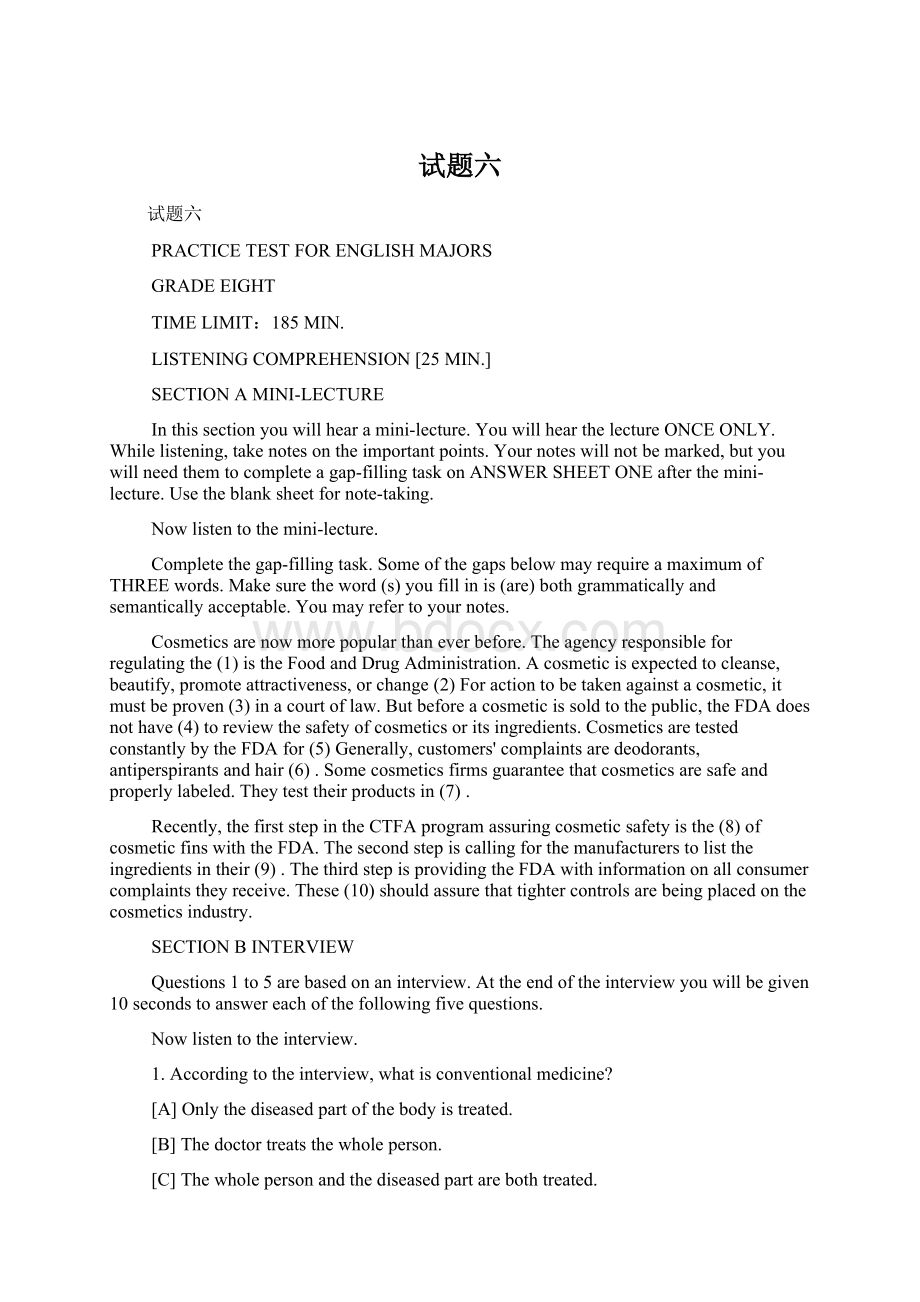试题六.docx
《试题六.docx》由会员分享,可在线阅读,更多相关《试题六.docx(22页珍藏版)》请在冰豆网上搜索。

试题六
试题六
PRACTICETESTFORENGLISHMAJORS
GRADEEIGHT
TIMELIMIT:
185MIN.
LISTENINGCOMPREHENSION[25MIN.]
SECTIONAMINI-LECTURE
Inthissectionyouwillhearamini-lecture.YouwillhearthelectureONCEONLY.Whilelistening,takenotesontheimportantpoints.Yournoteswillnotbemarked,butyouwillneedthemtocompleteagap-fillingtaskonANSWERSHEETONEafterthemini-lecture.Usetheblanksheetfornote-taking.
Nowlistentothemini-lecture.
Completethegap-fillingtask.SomeofthegapsbelowmayrequireamaximumofTHREEwords.Makesuretheword(s)youfillinis(are)bothgrammaticallyandsemanticallyacceptable.Youmayrefertoyournotes.
Cosmeticsarenowmorepopularthaneverbefore.Theagencyresponsibleforregulatingthe
(1)istheFoodandDrugAdministration.Acosmeticisexpectedtocleanse,beautify,promoteattractiveness,orchange
(2)Foractiontobetakenagainstacosmetic,itmustbeproven(3)inacourtoflaw.Butbeforeacosmeticissoldtothepublic,theFDAdoesnothave(4)toreviewthesafetyofcosmeticsoritsingredients.CosmeticsaretestedconstantlybytheFDAfor(5)Generally,customers'complaintsaredeodorants,antiperspirantsandhair(6).Somecosmeticsfirmsguaranteethatcosmeticsaresafeandproperlylabeled.Theytesttheirproductsin(7).
Recently,thefirststepintheCTFAprogramassuringcosmeticsafetyisthe(8)ofcosmeticfinswiththeFDA.Thesecondstepiscallingforthemanufacturerstolisttheingredientsintheir(9).ThethirdstepisprovidingtheFDAwithinformationonallconsumercomplaintstheyreceive.These(10)shouldassurethattightercontrolsarebeingplacedonthecosmeticsindustry.
SECTIONBINTERVIEW
Questions1to5arebasedonaninterview.Attheendoftheinterviewyouwillbegiven10secondstoanswereachofthefollowingfivequestions.
Nowlistentotheinterview.
1.Accordingtotheinterview,whatisconventionalmedicine?
[A]Onlythediseasedpartofthebodyistreated.
[B]Thedoctortreatsthewholeperson.
[C]Thewholepersonandthediseasedpartarebothtreated.
[D]Patientsaretreatedinaconventionalway.
2.Howdoesacupuncturework?
[A]Itworksonrheumatism.
[B]Itworksonblood.
[C]Itworksonarmsandlegs.
[D]Itworksonenergybalance.
3.WhatrelationshipdidtheChinesetraditionallyhavewiththeirdoctors?
[A]Doctorstreatedthepatients.
[B]Doctorswerepaidtokeeppeoplewell.
[C]Peoplewerefrightenedofdoctors.
[D]Theytreatedeachotherasfriends.
4.Whatisthedoctor-patientrelationshiplikeintheWest?
[A]Peoplepreferadoctorofholisticmedicine.
[B]Peopledon'tconsultadoctoreveniftheyareill.
[C]peopledon'tgotoseeadoctoruntiltheyareiii.
[D]Peopleoftenvisitadoctorwhethertheyareiiiornot.
5.Whatcanyouinferfromtheinterview?
[A]Westernersarecrazyaboutwork.
[B]Westernersemphasizeprevention.
[C]TheChinesepreferconventionalmedicine.
[D]TheChineseemphasizetreatment.
SECTIONCNEWSBROADCAST
Questions6to8arebasedonthefollowingnews.Attheendofthenewsitem,youwillbegiven10secondstoanswereachquestion.
Nowlistentothenews.
6.Thethreeseparateandco-equalbranchesare
[A]theexecutivebranch,president,andlegislativebranch.
[B]thepresident,congress,andthelegislativebranch.
[C]theexecutive,legislativeandjudicialdepartment.
[D]thesupremecourt,judicialandexecutivebranch.
7.Judicialdepartment,
[A]isthestrongestamongthethree.
[B]istheweakestamongthethree.
[C]makespublicpolicies.
[D]makesFederalLaws.
8.TheSupremeCourthas______inthelast50years.
[A]declared100federallawsunconstitutional
[B]declaredover1,000statelawsand100federallawsunconstitutional
[C]defendedcivillibertiesmoreoftenthanpropertyrights
[D]defendedpropertyrightsmoreoftenthancivilrights
Questions9and10arebasedonthefollowingnews.Attheendofthenewsitem,youwillbegiven10secondstoanswereachquestion.
Nowlistentothenews.
9.Theboat"Destiny"isabout
[A]100feetawayfromtheport.
[B]aquarterofkilometersawayfromtheport.
[C]100feetdeepinthewaterandaquarterofmileawayfromtheport.
[D]aquarterofmiledeepinthewaterandtoofeetawayfromtheport.
10.Howmanypeoplearebelievedtobekilledinthestorm?
[A]8.
[B]14.
[C]115
[D]6.
PARTⅡREADINGCOMPREHENSION[30MIN.]
Inthissectionthereareseveralreadingpassagesfollowedbyatotaloftwentymultiple-choicequestions.Readthepassagesandthenmarkyouranswersonyouranswersheet.
TEXTA
Howmuchsleepdoweneed?
Itisprobablytruetosaythatuptothirtyyearsagonotonlycouldwenotanswerthisquestion,butwecouldseenoresearchtoolswhichmighteventuallyenableustodoso.Sincethen,therehavebeenimportantdevelopmentswhichhavechangedthepicture;inparticularnewformsandtechniquesofneurophysiologicalmeasurementhaveemerged,andsecondly,experimentalpsychologyhasdevelopedbettermethodsofevaluatinghumanperformanceandbehaviour.Studies,forexample,ofbodyandeyemovements,ofsensorythresholds,andaboveall,oftheelectricalpotentialsofthebrainduringsleep,encourageustothinkthatwemaybeabletoassesswithusefulaccuracythedepthofqualityofsleep.Incarefullycontrolledexperimentsalsotheamountofsleephasbeencarriedtofindtheeffectsoflackofsleepuponperformanceanduponphysiologicalchangesinthebody,especiallythosewhichaccompanytheefforttomaintainnormalbehaviourandworkingstandardsinspiteofdeprivationofsleep.
Therearesomewhothinkwecanleavethebodytoregulatethesemattersforitself."Theansweriseasy,"saystheauthority."Withtherightamountofsleepyoushouldwakeupfreshandalertfiveminutesbeforethealarmrings."Ifheisright,manypeoplemustbeundersleeping,includingmyself.
Fromanimalswegettheimpressionthatitissatietyratherthanfatiguethatpromotessleep;manyofthemappeartoWakemainlytosatisfytheirbodilyneeds;duringtherestofthetimetheyreturntothenegativestateofsleep.Thismaybetrueforadulthumansalso,hutwiththeimportantdifferencethattheirneedsareoftensocomplexandlong-terminnaturethattheycanneverbecompletelysatisfied.
Otherpeoplefeelsurethatthecurrenttrendistowardstoolittlesleep.Toquoteonemedicalopinion,"Thousandsofpeopledriftthroughlifesufferingfromtheeffectsoftoolittlesleep;thereasonisnotthattheycan'tsleepbutthattheyjustdon't."Whatcouldbedisastrousisthatweshouldsacrificesleeponlytogainmoretimetojeopardizeourcivilizationbyactionsanddecisionsmadeweakbyfatigueandneurosis.
Thentocompletethepicture,therearethosewhobelievethatmostpeoplearepersuadedtosleeptoomuch.Dr.H.Roberts,writinginEverymaninHealth,asserts:
"Itmaysafelybeaffirmedthat,justasthemajorityeattoomuch,sothemajoritysleeptoomuch."Onecanseethepointofthisalso,itwouldbeapitytoretardourdevelopmentbyholdingbackthosepeoplewhoaregiftedenoughtoworkandplaywellwithlessthantheaverageamountofsleep,ifindeeditdoesthemnoharm.
Ofcourse,wearenotsure.Notonlyareweunabletogiveaformulaforindividualsleeprequirement,wecannotevengiveconfidentaveragesforthedifferentagegroups.Thisisbecausewehavenosubstantialscientificevidencetodrawfrom,andopinionsbasedonclinicalevidencepresentapicturewhichistoocontradictorytobeadependableguide.Indirectevidenceontheamountofsleepweneedcomesfromstudiesofwhathappenswhenwedowithoutit.Atfirstsightthesesuggestthatwedonotneedasmuchaswetake.Ithasbeendifficulttoshowanyeffectonperformanceofaslittleasonenight'slossofsleep,andevenafterthreedaysawakewecanexpectnormalefficiencyinamantakingresponsibledecisionsinajobwhichhefindsreallyabsorbingandexciting.Furthermore,whenatlastheisallowedtosleephewillprobablywakeaftersometwelvehoursandshowlittle,ifany,ill-effect.Theselaboratoryobservationsareborneoutbyexamplesineverydaylife.Itseemsclearthatthehumanbodyisequippedtoover-ridetheneedforsleepinordertomeetemergenciesofquitelongdurationwithfacultiesunimpaired.Butthisreversibilityoftheeffectoflossofsleepinfaceofurgentandabsorbingdemandsmaybethegreatestsourceofdanger.Peoplemaythinktheyaremoreefficientthantheyreallyare.
11.Accordingtothepassage,whichofthefollowingcontributeslittletothestudyofsleep?
A.Advancementinneurophysiologicalmeasurement.
B.Improvementinexperimentalpsychology.
C.Studiesoftheelectricalpotentialsofthebrain.
D.Experimentsofphysiologicalchangesinthebody.
12.Inwhatrespectarehumansandanimalsalikeinsleep?
A.Forbothofthemeonlyfatiguecanpromotesleep.
B.Forbothofthem,overeatingmaypromotesleep.
C.Forbothofthem,theywakeonlytosatisfytheirbodilyneeds.
D.Forbothofthem,theyneedtobecompletelysatisfiedtopromotesleep.
13.Theauthorofthepassagemaybelievethat______.
A.insufficientsleepmaybecomedangeroustoourcivilization
B.excessofsleepmaycausealosstothecommunity
C.wedonotneedasmuchsleepaswetake
D.deprivationofsleepinemergenciesmaydonoharmtoourbody
14.Itcanbeinferredfromthepassagethat______.
A.differentpeoplemayhavequitedifferentsleeprequirements
B.wecanleaveourbodiestoregulateoursleeprequirementforitself
C.wecanmaintainnormalbehav